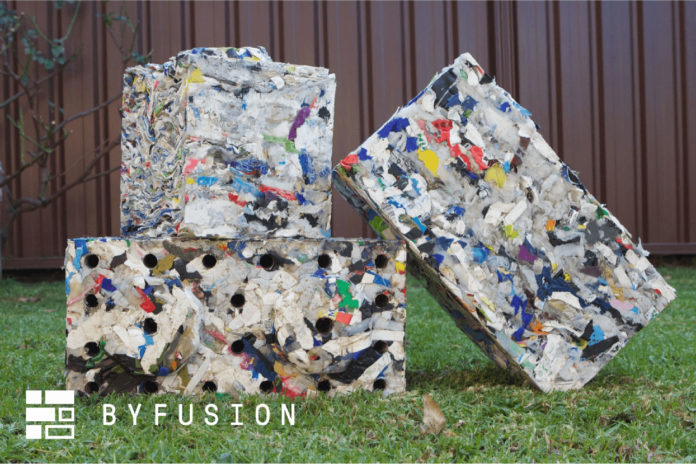Single-use plastics continue to reign supreme. Many companies in the startup ecosystem are trying to solve this serious environmental problem with technology and creativity.
Los Angeles-based company ByFusion wants to resurrect even that non-recyclable plastic, bringing it back to life in the form of multi-purpose building bricks. The company uses a combination of steam and compression to shape all kinds of plastics, including the non-recyclable ones, into super-efficient and convenient building blocks, called ByBlocks. These can be used in construction to build anything from fences and retaining walls to public terraces and bus stops.
To produce these eco-conscious blocks, ByFusion uses patented machines called Blockers. These hefty machines are fed mounds of plastic that are squeezed into colorful blocks – no pre-sorting or cleaning needed, saving precious time and resources.
The blocks measure 40cm x 20cm x 20cm, weighs 10kg each, and are more durable than hollow cement blocks. They come in three distinct models – some are designed with pegs so they can interlock; others are flat so builders can easily mount other components like a roof on top; and others are a combination of the two. The company is already working on some smaller ones in cube format.
The procedure requires no chemicals, additives, nor fillers, and it generates 41% fewer greenhouse gas emissions than concrete blocks. The ByBlocks also don’t crack or crumble like standard blocks. But since plastics are susceptible to sunlight, outdoor projects would have to be coated in clear paint or paired with another weather-resistant material.
Applications for the ByBlocks include retaining walls, sound walls, sheds, privacy fencing, terracing and landscaping, accent walls. The company also sells furniture products made from recycled plastic blocks, such as a planter and a coffee table set.
It is estimated that ByFusion has recycled 103 tons of plastic to date, but it aims to recycle 100 million tons by 2030, which would be a quarter of the US’s annual plastic production.
